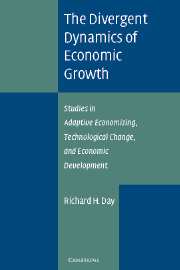 The Divergent Dynamics of Economic Growth
The Divergent Dynamics of Economic Growth A Classical Analysis
Published online by Cambridge University Press: 08 August 2009
A classical economic analysis of productivity and population growth is used to explain the rise in well-being during the expansion of feudalism, the emergence of class conflict, the demise of the manorial system, and the establishment of precapitalism. These events are given a new interpretation that involves a specific sequence of endogenously generated economic pressures. An indeterminacy remains, however, that allows for alternative histories in particular settings of time and place through the interplay of political and other institutional forces.
On Theory and History
The pure classical economic theory provides an endogenous explanation of how economic conflict might emerge and how a switch in socioeconomic regime might occur through the interaction of population growth and productivity. This little-appreciated implication of the basic Smith–Malthus model is here used to illuminate (1) the expansion of manorialism, (2) a period of shifting class interests in alternative distribution mechanisms, (3) the demise of the traditional share system, (4) the emergence of precapitalism, (5) successive surges in population growth, and (6) varied effects of the plague, including accelerated growth of the labor market or, contrastingly, a prolongation or temporary restoration of manorialism.
These events are given a new interpretation involving a specific sequence of switching economic pressures and class conflicts. This interpretation is not drawn from empirical research but is obtained a priori, as it were, from the classical model. There is evidence already in the literature, however, that would seem to provide a basis for believing in its relevance.
To save this book to your Kindle, first ensure [email protected] is added to your Approved Personal Document E-mail List under your Personal Document Settings on the Manage Your Content and Devices page of your Amazon account. Then enter the ‘name’ part of your Kindle email address below. Find out more about saving to your Kindle.
Note you can select to save to either the @free.kindle.com or @kindle.com variations. ‘@free.kindle.com’ emails are free but can only be saved to your device when it is connected to wi-fi. ‘@kindle.com’ emails can be delivered even when you are not connected to wi-fi, but note that service fees apply.
Find out more about the Kindle Personal Document Service.
To save content items to your account, please confirm that you agree to abide by our usage policies. If this is the first time you use this feature, you will be asked to authorise Cambridge Core to connect with your account. Find out more about saving content to Dropbox.
To save content items to your account, please confirm that you agree to abide by our usage policies. If this is the first time you use this feature, you will be asked to authorise Cambridge Core to connect with your account. Find out more about saving content to Google Drive.